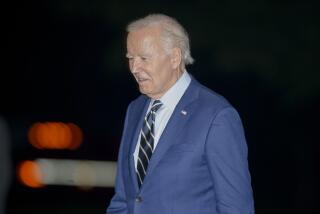Israel’s Netanyahu makes big pitch to claim Iran is cheating on nuclear deal; Trump likes what he hears
Reporting from Jerusalem — Israeli Prime Minister Benjamin Netanyahu on Monday accused Iran of lying and cheating on the landmark 2015 nuclear deal from which President Trump has threatened to withdraw.
Netanyahu, who opposed the deal, made a presentation at the Israeli Defense Ministry, alongside oversize photographs of Iranian documents he described as secret. Israel obtained 100,000 Iranian documents a few weeks ago, and they had been corroborated by U.S. intelligence agencies, he said.
The cache proved, he said, that Iran’s role in the nuclear deal, which bans the country from producing nuclear weapons and includes other restrictions, was “based on lies.”
Netanyahu said the documents revealed details of a clandestine program called Project Amad whose aim was to build nuclear weapons. Though it was shelved in 2003, Netanyahu said, Iran cheated by failing to disclose Project Amad when signing the 2015 nuclear deal with the United States and other world powers.
“Iran did not come clean on its nuclear program,” Netanyahu said, clutching a microphone and roaming the stage with backdrops of brightly colored graphs and a huge sign, “Iran lied.”
Trump has repeatedly threatened to “rip up” the deal, which he has called the worst in history. Still, he has certified Iran’s compliance every three months of his presidency to maintain the suspension of onerous economic sanctions against Iran.
Trump has said he won’t certify Iran’s compliance again, but has not announced a decision. The next date for a certification decision is May 12, and insisting on reimposing sanctions, as he has indicated he might do, could cause the deal to unravel.
Netanyahu’s elaborate PowerPoint presentation, given in English rather than Hebrew and telecast live internationally, appeared to be a way of encouraging Trump to dump the deal.
The two men, both of whom have long said they loathed the agreement, gave news conferences one after the other, Trump appearing at the White House about half an hour after Netanyahu finished in Tel Aviv.
They also spoke by telephone over the weekend, the White House said, and Trump’s new secretary of State, Mike Pompeo, met with Netanyahu in Tel Aviv on Sunday.
“We’ll see what happens,” Trump said at a Rose Garden news conference where he was hosting Nigerian President Muhammadu Buhari.
Netanyahu’s presentation, Trump told reporters, proves “I’ve been 100% right.”
“I’m not telling you what I’m doing, but a lot of people think they know,” Trump said. “And on or before the 12th we’ll make a decision. That doesn’t mean we won’t negotiate a real agreement.”
He has said he might agree to stick with the deal if European leaders who are cosignatories “fix” it by addressing Iran’s ballistic missile program and its support for militant groups and by removing the expiration dates on some restrictions.
German Chancellor Angela Merkel and French President Emmanuel Macron went to Washington separately last week to lobby Trump against abandoning the agreement. Germany, France, the United States, Britain, Russia and China signed the agreement with Iran.
Under the accord, Iran destroyed or dismantled the bulk of its nuclear infrastructure and shipped its nuclear fuel out of the country. In exchange, a network of international economic sanctions was eased, and seized property, including cash held in U.S. banks, was returned to Tehran.
Some observers who generally support the deal downplayed Netanyahu’s claims.
“We know Iran lied in the past; the key question is whether Iran has lied to the world [and] inspectors since signing” the nuclear deal in 2015, said Samantha Vinograd, who served on President Obama’s National Security Council team that helped to craft the accord.
Suzanne Maloney, a senior fellow at the Brookings Center for Middle East Policy, echoed several who said that if Iran is cheating, that’s precisely a reason to stick with the deal.
“Nothing that Netanyahu has said so far undercuts the rationale for the” Iran nuclear deal, Maloney, a former State Department official, said on Twitter. “That deal was predicated on a very clear & broad understanding by all the parties that Iran was pursuing a nuclear weapons program.”
Netanyahu’s speech was announced midafternoon as an “address to the nation” that would reveal “dramatic” news regarding the Iran deal, a day after Israel may or may not have been behind deadly airstrikes targeting Iranian positions in Syria. The Israeli stock market fell sharply in anticipation of dire news. Panicked Israelis, fearing their prime minister was about to declare war, flooded drive-time radio news shows.
Netanyahu, faced with corruption investigations and whose coalition government has been menaced by rebellious ministers, has staked his reputation as an expert reader of the U.S. political sphere and on a close alliance with Trump.
Iran’s foreign minister, Mohammad Javad Zarif, mocked both leaders on Twitter. He teased Netanyahu for acting like “the boy who can’t stop crying wolf” and claimed Trump was “jumping on a rehash of old allegations” already resolved by U.N. inspectors from the International Atomic Energy Agency, who have judged the Islamic Republic to be generally in compliance with the deal’s restrictions.
For more on international affairs, follow @TracyKWilkinson on Twitter
Special correspondent Tarnopolsky reported from Jerusalem and Times staff writer Wilkinson from Washington.
More to Read
Sign up for Essential California
The most important California stories and recommendations in your inbox every morning.
You may occasionally receive promotional content from the Los Angeles Times.











